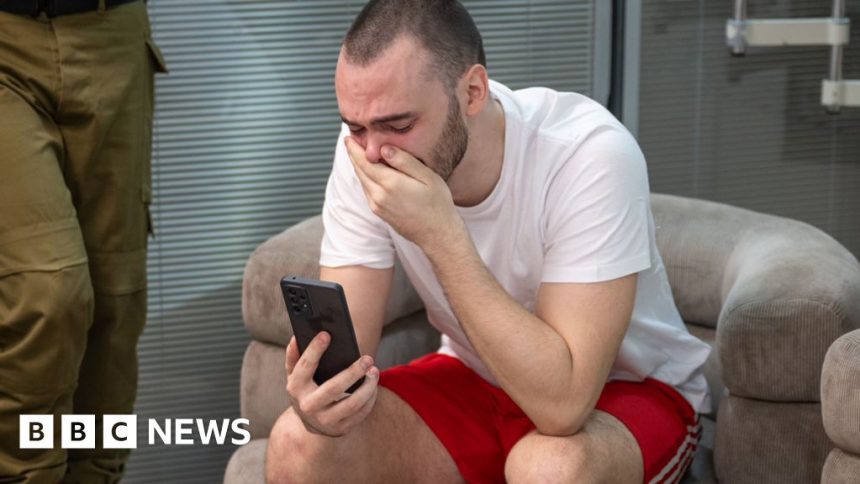‘Forced to speak in a whisper’ – Hamas hostage’s ‘miracle’ rescue
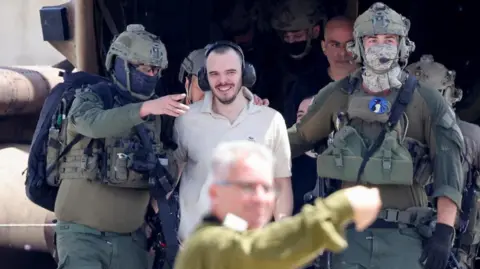 Reuters
Reuters“They were forced to speak in a whisper,” says Michael Kozlov, whose son was one of four hostages dramatically rescued by Israeli special forces from Hamas captivity in central Gaza on Saturday.
For the parents of Russian Israeli, Andrey, one of what the military codenamed “diamonds” during its operation, it was nothing short of “a miracle”.
Speaking to the BBC, Eugenia and Michael Kozlov gave an emotional account of how they heard the news that their son was free and details of his ordeal over eight months.
Bodycam footage released by the Israeli military shows Andrey, 27, and another hostage, holding up their hands fearfully as they hid behind cushions after their rescuers burst into the room where they were being held.
Incredibly, after months of attempted brainwashing by their captors, his mother, Eugenia Kozlova says the hostages were not clear whether the plan was “to kill or to save” them.
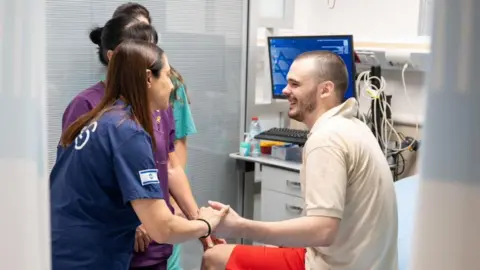 Reuters
ReutersThe men had all been told that Israelis had forgotten about those held captive, that they were perceived as a problem by the Israeli authorities and might well be targeted to get rid of them, if their presence was discovered.
Michael Kozlov says his son and the other hostages were told to keep their voices down because, according to their guards, “a special reconnaissance aircraft – a drone – was listening in and could hear what they were saying in Hebrew”.
“This caused such deep psychological trauma that it forced him to some extent to believe their words,” Mr Kozlov adds.
“He was lost until he realised he was being saved.”
Andrey – along with the three others rescued from Gaza’s Nuseirat camp, Noa Argamani, Almog Meir Jan and Shlomi Ziv – had been abducted from the Nova music festival on the morning of 7 October. He had been working there as a security guard having moved to Israel from Russia just 18 months earlier.
Eugenia Kozlova, who mainly lives in St Petersburg, has regularly come to Israel to join hostage family rallies and meet politicians and army representatives, and was due to fly back to Tel Aviv when Israeli officials telephoned her with news about her son.
“I thought it was bad news and I began to shout: ‘No!’ I threw my phone away and it fell somewhere under the table,” she recalls.
“I could hear them shouting from under the table: ‘We have good news!’
“I crawled under the table. ‘What are you saying?’
“Very good news: Andrey was released. My English is not that good. I asked them to repeat it.”
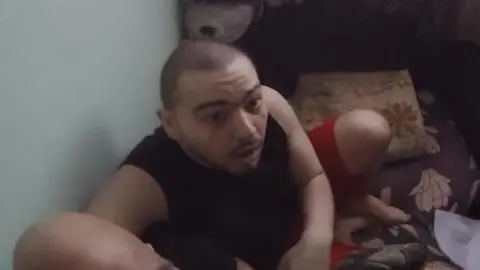 Israel Police
Israel PoliceBoth were worried about how Andrey would appear when they first saw him on a video call but were relieved to find that he appeared to be himself.
“He laughed, he joked. Just three hours after he was in Gaza he managed to joke,” his mother says.
“He was in prison, he was a prisoner, then after some insignificantly small number of hours, he found himself back on Israeli territory,” she adds.
The Kozlovs do not go into details of what their son has said about the circumstances of his rescue. After the three male hostages were rescued from a family’s apartment in Nuseirat’s urban refugee camp, the Israeli military says there was a gunfight with the Hamas guards.
Later, the lorry being used to evacuate the hostages and a fatally wounded special forces officers broke down and was surrounded by armed men, according to Israeli officials. Heavy bombing by the Israeli air force was meant to give the rescuers time and cover to escape.
Gaza health officials say that the event was one of the deadliest since the war started and that more than 270 Palestinians were killed.
Israel’s military says fewer than 100 were killed. It holds Hamas responsible for civilian deaths as it was hiding hostages in a densely populated place.
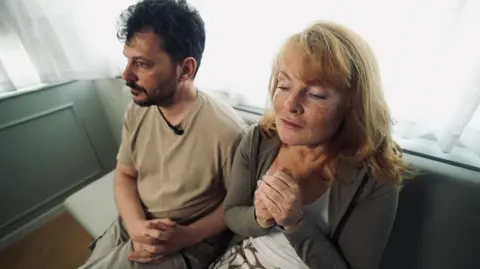
“For two months he was tied up – hands and feet,” his mother says, her voice wavering. As Andrey hated to eat “like an animal”, he would try to wriggle to bring his hands from behind his back.
“He took it as a gift from Gaza when his hands were finally tied in front,” his father adds.
The hostages’ captors “humiliated and beat them”, Michael Kozlov goes on, but worst still was the cruel taunting.
“They were always under psychological pressure. ‘Your mother has already gone on vacation to Greece. We know it. We saw it. Your wife is dating someone else,'” Eugenia recounts.
Across Israel there has been a euphoric response to the dramatic rescue operation.
“People lean out of their cars and shout and greet Andrey. Now we are watching the news, and I am astounded that the release of the four hostages has become a celebration for all of Israel,” says Eugenia.
Israel is still reeling from the Hamas-led attacks which killed about 1,200 people eight months ago. Out of over 240 hostages who were seized and taken to Gaza, more than 100 were released in a week-long ceasefire in November. Israel says there are now 116 hostages who were abducted that day who remain in Gaza – including about one-third whom it has concluded are no longer alive.
Prior to Saturday’s rescue only three Israeli hostages held in Gaza had been released as a result of the military’s ground assault, and the success of the latest operation gave the nation a boost.
For Eugenia – who has come to know many relatives of hostages – there are constant reminders of how lucky she is. Around Tel Aviv and close to Andrey’s home in central Israel, there are many posters plastered up of those who are still missing.
“It is very sad to look at these portraits,” she says. “They’re everywhere. And now I look into their faces, and I seem to have a feeling of guilt, because we understand very well, we tell each other several times a day, that this is a miracle!”
Despite all that their son suffered, the Kozlovs are inclined to believe his guards who told him that he was held in a better situation than many other Israeli hostages – kept in tunnels underground and deprived of light.
“We constantly think about those people who are still there. We must definitely save them,” Michael says emphatically.
While they have not given up campaigning for the hostages, the family is now putting much of their energy into helping Andrey adjust to life back home after he underwent medical checks and was discharged from hospital.
After 245 days in captivity, he is still catching up on all the developments that have taken place – including the huge marches demanding that the Israeli government bring the hostages home.
“He is surprised by so many things and then news that he didn’t know sometimes stops him from sleeping,” his mother says.
“Then he reads articles, and he says: “Is this true? Is this true? Did it happen?”



